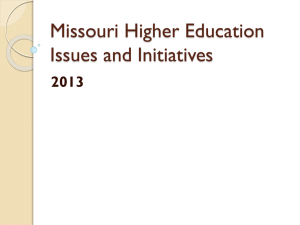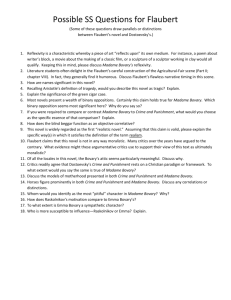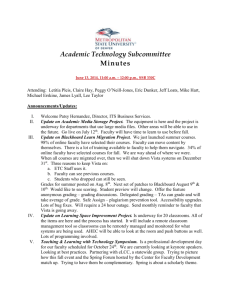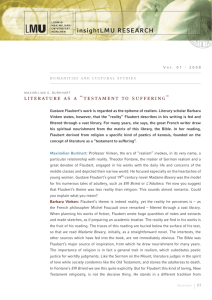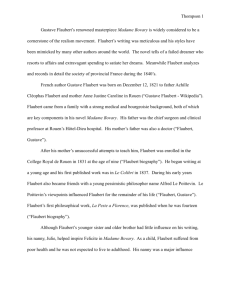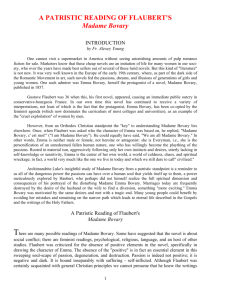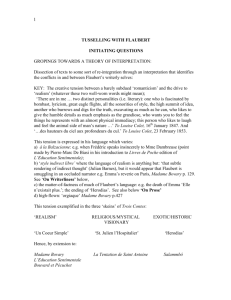Prof. Marisa Verna
advertisement
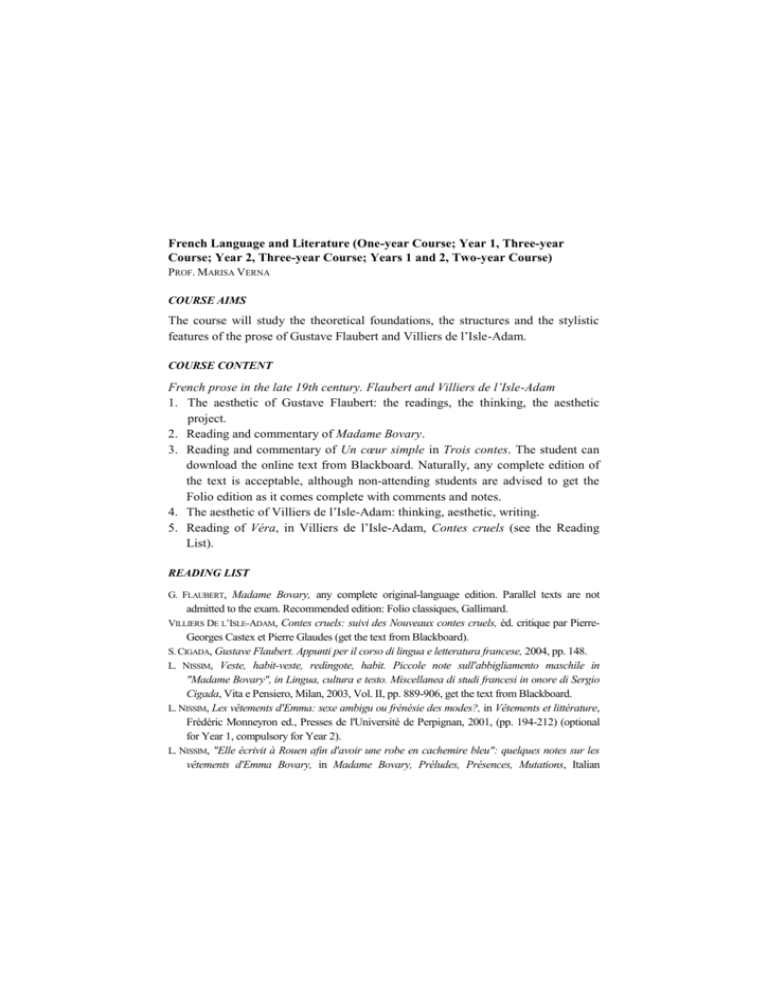
French Language and Literature (One-year Course; Year 1, Three-year Course; Year 2, Three-year Course; Years 1 and 2, Two-year Course) PROF. MARISA VERNA COURSE AIMS The course will study the theoretical foundations, the structures and the stylistic features of the prose of Gustave Flaubert and Villiers de l’Isle-Adam. COURSE CONTENT French prose in the late 19th century. Flaubert and Villiers de l’Isle-Adam 1. The aesthetic of Gustave Flaubert: the readings, the thinking, the aesthetic project. 2. Reading and commentary of Madame Bovary. 3. Reading and commentary of Un cœur simple in Trois contes. The student can download the online text from Blackboard. Naturally, any complete edition of the text is acceptable, although non-attending students are advised to get the Folio edition as it comes complete with comments and notes. 4. The aesthetic of Villiers de l’Isle-Adam: thinking, aesthetic, writing. 5. Reading of Véra, in Villiers de l’Isle-Adam, Contes cruels (see the Reading List). READING LIST G. FLAUBERT, Madame Bovary, any complete original-language edition. Parallel texts are not admitted to the exam. Recommended edition: Folio classiques, Gallimard. VILLIERS DE L’ISLE-ADAM, Contes cruels: suivi des Nouveaux contes cruels, éd. critique par Pierre- Georges Castex et Pierre Glaudes (get the text from Blackboard). S. CIGADA, Gustave Flaubert. Appunti per il corso di lingua e letteratura francese, 2004, pp. 148. L. NISSIM, Veste, habit-veste, redingote, habit. Piccole note sull'abbigliamento maschile in "Madame Bovary", in Lingua, cultura e testo. Miscellanea di studi francesi in onore di Sergio Cigada, Vita e Pensiero, Milan, 2003, Vol. II, pp. 889-906, get the text from Blackboard. L. NISSIM, Les vêtements d'Emma: sexe ambigu ou frénésie des modes?, in Vêtements et littérature, Frédéric Monneyron ed., Presses de l'Université de Perpignan, 2001, (pp. 194-212) (optional for Year 1, compulsory for Year 2). L. NISSIM, "Elle écrivit à Rouen afin d'avoir une robe en cachemire bleu": quelques notes sur les vêtements d'Emma Bovary, in Madame Bovary, Préludes, Présences, Mutations, Italian translation Preludi, Presenze, Mutazioni, edited by R.M. Palermo, EDI, Naples, 2007, pp. 159171, (optional for Year 1, compulsory for Year 2). The student can find the text on Blackboard. S. CIGADA, I «Trois contes» nella storia dell’arte flaubertiana, in Contributi del seminario di filologia moderna, French series, vol. II, Milan, Vita e Pensiero, p. 252-269. AA.VV., Antimimesis, Schena, Fasano, 1997, optional. E. AUREBACH, Nell’hôtel de la Môle, Stendhal, Balzac, Flaubert, in Mimesis, Turin, Einaudi, 2000, (only the essay on Flaubert: recommended). The text can be found at the library. Course notes: compulsory for all students, the notes can be downloaded from Blackboard. TEACHING METHOD The student must supplement the Special Subject course (Professor Verna) with the following practical classes and readings: Three-year course students (Faculty of Languages) taking Year 1: Dr. Federica Locatelli, French Literature Practical Classes, Year 1, according to the methods and timetable indicated herein; Three-year course students (Faculty of Languages, curriculum: Foreign Languages and Literature) taking Year 2: Dr. MariaCristina Pedrazzini, French Literature Practical Classes, Year 2 according to the methods and timetable indicated herein; Three-year course students (Faculty of Languages, curriculum: Language Expert for Management and Tourism; Faculty of Language Sciences, curriculum: Languages, Communication and Media (semester students): Dr. Federica Locatelli, according to the methods and timetable indicated herein; One-year course and Two-year course students (both specialists and non-specialists): These students must attend the supplementary French Lanaguage Practical Classes held by Dr. Isabelle Morel. Students earning 8 training credits (CFU) from the French Language and Literature course are not allowed to replace the exam with SELDA certification. ASSESSMENT METHOD One-year and two-year course students must sit the exam in a single session; the exam comprises a written and oral language part, which the student must pass in order to take the literature part. One-year and first-year students will take the exam in Italian; second-year students will take the exam in French. Exclusively Faculty of Arts and Philosophy students (one-year course) can replace the language exam with the SELDA exam. Faculty of Arts and Philosophy students who want to repeat the exam a second time must attend the French Lanaguage Practical Classes (Year 2) held by Dr. Isabelle Morel. See the French Lanaguage Practical Classes course programme contained in this guide for information on the assessment method for the language part of the exam. The student must translate the course texts accurately before they can proceed to that part of the exam on the commentary of Flaubert’s texts and aesthetic, otherwise they will not be able to sit the exam. NOTES The course is open to the following students: Year 1, three-year course students; Year 2, three-year course students of Foreign Languages and Literature of the Faculty of Language Sciences; one-year students (Arts and Language Sciences); Year 1 and Year 2, two-year course students (both Faculty of Language Sciences and Faculty of Arts); Year 1 and Year 2, university master’s degree third-language students (i.e., those who start to learn a new language for their university master’s degree, Faculty of Language Sciences). All second-year students, regardless of their curriculum or Faculty, will take solely the first 30 hours of this course (Professor Verna). The following 30 hours will be taken with Professor Davide Vago, French Language and Literature 2, three-year course A, slated for semester two, for which the language of instruction is French. The course held by Professor Verna is of 4 hours per week and will thus end around March. After which, the same weekly hours will be dedicated to the practical classes for both the first and second year (three-year course students, Faculty of Languages). The student is invited to check the Professor Verna’s webpage and the course Blackboard page (http://www.blackboard.it) regularly for any communications and to download useful study materials. Further information can be found on the lecturer's webpage at http://docenti.unicatt.it/web/searchByName.do?language=ENG, or on the Faculty notice board. French Language Practical Classes (Year 1, Three-year Course) DR. FEDERICA LOCATELLI COURSE AIMS The course sets out to map the history of French literature from the 16 th to the 18th century. We will see how a new hierarchy of values and the centrality of the individual were established and, in particular, how all the barriers of action were torn down as Man increasingly claimed the freedom to express himself through his creative activity, to shape the world around him by building his civilization and his history. This historical, intellectual, artistic and social journey culminates in the proclamation of the ideals of the French Revolution, i.e., liberty, equality and fraternity, of which the literary voice of Humanism and Enlightenment became increasingly stronger. The different approaches to the chosen thematic nucleus will enable us to study the historic-cultural backdrop against which the literary work was produced, as well as the linguistic, stylistic and formal strategies used to portray the ideal of freedom and the hailing of the pre-eminence of reason as proposed in the literature of the centuries under analysis. COURSE CONTENT Liberté au nom de la raison: de l’Humanisme aux Lumières Analysis of a selection of literary texts (poetry, theatre pièces and prose) from Rabelais (Pantagruel 1532, Gargantua 1534) to Voltaire (Dictionnaire philosophique 1764) to understand the frequency of the thematic thread proposed in the 16th, 17th and 18th centuries and its impact on the diverse cultural movements of production and reception. Overview of the theoretical and contextual lines needed to understand the writings and the methodology needed to analyze the literary work through practical tests that will be assessed as an integral part of the final exam. READING LIST The lecturer will provide a course pack containing the selection of texts to be analyzed and the documentation needed to understand the relative historical and socio-cultural context. In addition to the course pack and Blackboard material (Professor Verna), the student must choose, read and translate the complete version of one of the following literary works: RABELAIS, Pantagruel, Gargantua. DU BELLAY, Les Regrets. MONTAIGNE, Essais. DESCARTES, Méditations philosophiques, Principes. PASCAL, Pensées. MOLIÈRE, École des femmes, Les Femmes savantes. MONTESQUIEU, L’esprit des lois. ROUSSEAU, Du contrat social, Essais sur l’origine des langues, Lettres écrites de la montagne. VOLTAIRE, Dictionnaire philosophique. TEACHING METHOD Lectures scheduled for after the end of the Special Subject course held by Professor Marisa Verna. Practical workshops for the analysis of the course texts and to equip the students with the tools need to analyze the different types of literary texts; final test the result of which will be incorporated into the final exam assessment. All the course students must register with Blackboard, the online platform that is an integral part of the course, and consult the course page regularly. ASSESSMENT METHOD The exam is in two parts: final written exam at the end of the course and an oral exam in Italian, in which the student will need to demonstrate their knowledge of the course pack texts and the complete version of the chosen text. The accurate translation of the poetic tests is a prerequisite to take the exam on the commentary of the text and the aesthetic under analysis. NOTES Further information can be found on the lecturer's webpage at http://docenti.unicatt.it/web/searchByName.do?language=ENG, or on the Faculty notice board. French Literature Practical Classes (Year 2, Three-year Course students of the Faculty of Language Sciences; curriculum: Foreign Languages and Literature) PROFESSOR MARIA CRISTINA PEDRAZZINI COURSE AIMS In this course, we will study 19th-century French poetry, prose and drama. COURSE CONTENT Romantic and post-Romantic poetry: Lamartine, Vigny, Hugo, Gautier, Baudelaire. Romantic prose: Chateaubriand. Theatre: Hugo. Realist-naturalist prose: Maupassant. READING LIST The lecturer will prepare a course pack of the poetry CHATEAUBRIAND, René, Ed. Gallimard. HUGO, Ruy Blas, Ed. Gallimard. MAUPASSANT, La dot ; Aux champs, available at http://maupassant.free.fr/. The following manuals are reccomended for an overview of literary history: J.P. BERTRAND-A. VAILLANT-P. REGNIER (éd.), Histoire de la littérature française du XIXe siècle, Presses Universitaires de Rennes, 2007. P. BRUNEL-Y. BELLENGER, Histoire de la littérature française XIXe et XXe siècles, Bordas. S. LONGO-M.C. CHASTANT, Regards. Histoire et anthologie de la littérature d’expression française, XIXe siècle, Hoepli, Milan, 2004. The students need to prepare the chapters on the authors studied in the course for the exam. TEACHING METHOD General studies, such as the history of the era, the thinking and 19th-century French literature, readings and textual analysis. ASSESSMENT METHOD Final oral exam, in which the student will be asked to present 19th-century French literary history and to read, translate and analyse passages of the works dealt with in the course. NOTES This 20-hour course is open to all second-year three-year course students of the Faculty of Language Sciences and will start after the end of the Special Subject Course taken by Professor Marisa Verna. The student is invited to check the lecturer’s webpage and the Foreign Languages and Literature notice board (Necchi 9, 4th floor) regularly for variations and integrations to the course. Further information can be found on the lecturer's webpage at http://docenti.unicatt.it/web/searchByName.do?language=ENG, or on the Faculty notice board.

